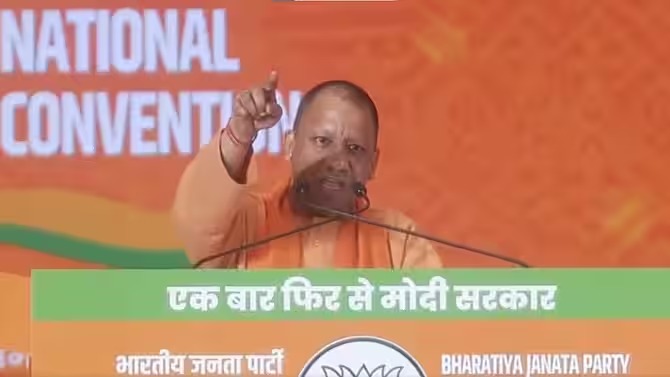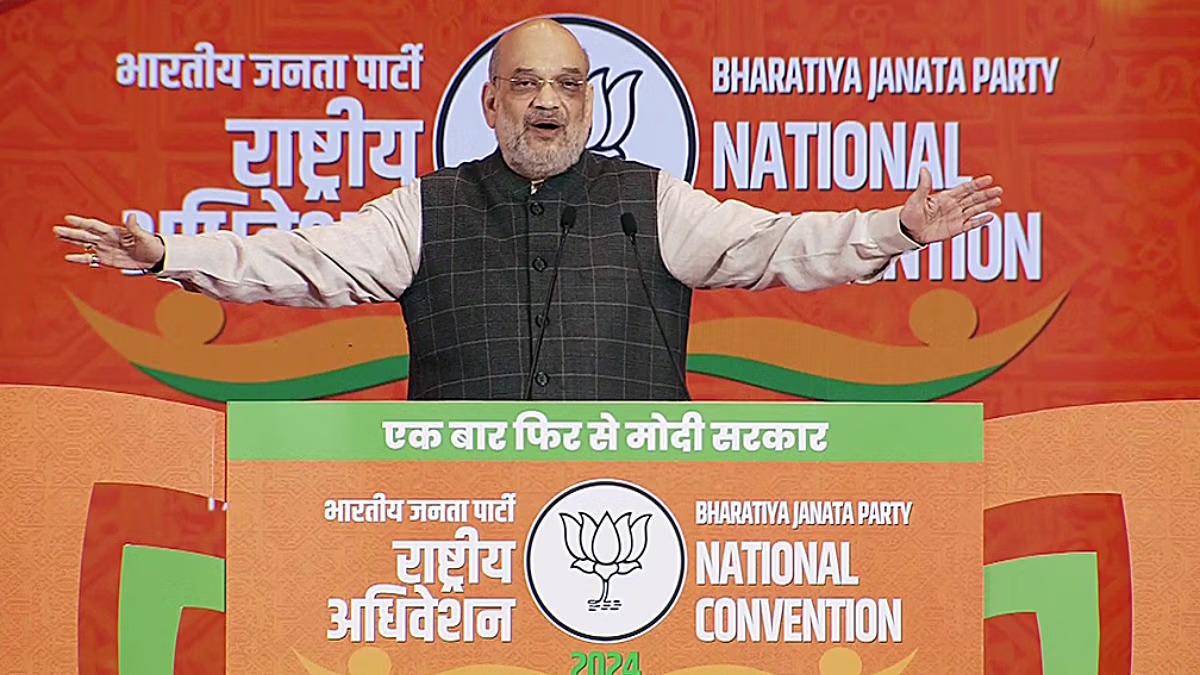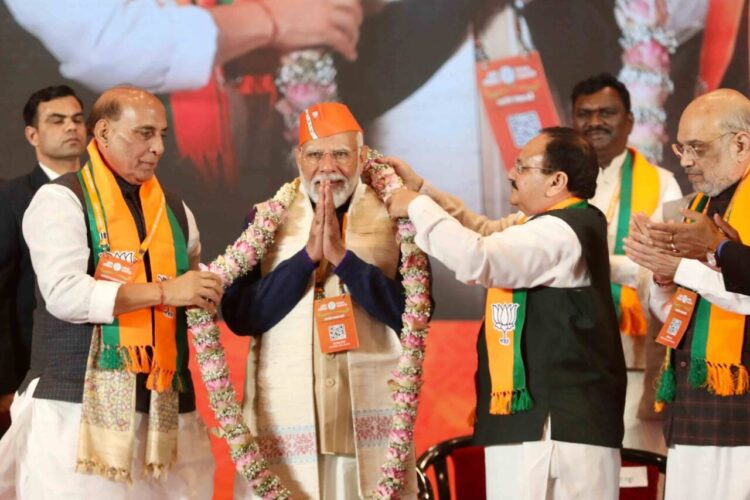Ahead of the Lok Sabha polls, a two-day Bharatiya Janata Party (BJP) national convention concluded in New Delhi. With approximately 11,500 delegates in attendance, including Union Ministers, Chief Ministers from BJP-governed states, state ministers, national and state party officials, as well as MPs and MLAs, the event marked a significant prelude to the impending elections.
During the convention, the BJP adopted historical resolutions highlighting their accomplishments and commitments, anchored by the assurance of “Modi ki Guarantee.” These resolutions underscored the party’s unity in celebrating the monumental achievement of the Ram Mandir and delineated a comprehensive roadmap for the nation’s future trajectory.
Additionally, a political resolution passed during the convention commended PM Modi for his leadership, citing his effective implementation of governance principles akin to “Ram Rajya” and his transformative role in propelling the Indian economy from the “Fragile five” to the “Top five” over the past decade.
Of notable mention was a resolution directed at the opposition, specifically focusing on the I.N.D.I Alliance underscored the BJP’s determination to confront and dismantle political rivals ahead of the electoral fray. Also noteworthy was the passage of a significant amendment to the party constitution, endorsed by the majority at the convention.
Amended Party’s Constitution
The BJP made significant amendments to its constitution on February 18, granting expanded powers to its apex organisational body, the Parliamentary Board, particularly in matters pertaining to the party president’s tenure and extensions during “emergency” situations.
A proposal to this effect was tabled by the party’s general secretary, Sunil Bansal, and subsequently ratified by the convention attendees. This move marks a departure from the established practice wherein the party president is elected through organisational elections conducted across at least 50 per cent of its state bodies. However, logistical challenges arise during periods when the party is deeply engaged in preparing for Assembly or Lok Sabha elections, making adherence to this practice impractical.
The incumbent president, J.P. Nadda, currently enjoys an extended tenure until June 30, in light of the impending Lok Sabha elections. While the party has not provided detailed insights into the rationale behind the constitutional amendment, insiders suggest it may facilitate smoother transitions in future presidential appointments.

Moreover, the two-day convention, which concluded on February 18, witnessed the passage of three resolutions. Speculations abound regarding potential defections from other political parties to the BJP, with particular attention on achieving the ambitious target of securing 370 seats in the 543-member Lok Sabha.
A meeting of Chief Ministers and Deputy Chief Ministers of the BJP ensued following the convention’s adjournment, focusing on electoral strategies aimed at achieving the party’s ambitious electoral targets. Prime Minister Narendra Modi and President J.P. Nadda were among the attendees, underscoring the significance of the discussions.
PM Modi later took to social media to provide insights into the discussions, emphasising the need to bolster the growth trajectory of states governed by the BJP. He highlighted the imperative of leveraging the double engines of central and state governance to foster holistic development, encapsulated in the concept of “Viksit Bharat” or Developed India.
Resolution on ‘Viksit Bharat’
In a resounding affirmation of PM Modi’s leadership, the BJP passed a resolution, commending Modi’s endeavours to showcase India’s rich cultural heritage on the global stage. From initiatives like Yoga and the Ram Mandir to the Kartarpur Corridor and the Abu Dhabi temple, the resolution applauded Modi’s efforts to honour India’s traditions and values worldwide.
The resolution, titled “Viksit Bharat-Modi ki Guarantee,” received overwhelming support from leaders across the party spectrum. Moved by Defence Minister Rajnath Singh and seconded by Finance Minister Nirmala Sitharaman, it not only celebrated the BJP’s success in winning hearts across the nation but also took a swipe at the opposition, condemning what it termed as “caste-based politics.”
Amid ongoing Punjab farmers’ protests, Defence Minister Rajnath Singh underscored the Modi government’s commitment to the welfare of farmers, emphasising that no previous administration had done as much for this vital sector. Finance Minister Nirmala Sitharaman highlighted India’s resilient economy amidst global recessionary trends, pointing to the nation’s growing prominence on the international stage.
Uttar Pradesh Chief Minister Yogi Adityanath hailed the construction of the Ram Mandir in Ayodhya as a historic moment that fulfilled centuries-old aspirations of devotees, heralding a new era for followers of Sanatan Dharma.
The resolution reflected on the transformative impact of Modi’s leadership over the past decade, citing unprecedented economic growth, enhanced global influence, and a steadfast commitment to India’s civilisational heritage. It pledged to realise the vision of a developed India, aptly termed ‘Viksit Bharat,’ before the centenary year in 2047, backed by what it termed as the “Modi Guarantee.”

The resolution also rebuked the opposition for its boycott of Ayodhya’s Ram Mandir inauguration and consecration ceremony, labelling it as a display of partisan politics over national unity.
Furthermore, it hailed Modi’s efforts to revive cultural centres across the country, citing initiatives like the Kashi Vishwanath Corridor, Kartarpur Corridor, and the reconstruction of revered temples. The resolution noted with pride India’s rising stature in global forums, exemplified by its role in the G20 Summit and its emergence as the voice of the Global South.
The BJP resolution also addressed the recent violence in Sandeshkhali, West Bengal, under the rule of the Trinamool Congress, condemning it as an affront to humanity.
Overall, the resolution served as a testament to Modi’s transformative leadership and the BJP’s unwavering commitment to advancing India’s cultural heritage, economic prosperity, and national unity on both domestic and international fronts.
BJP Desh Ki Aasha, Vipaksh Ki Hatasha
In a rare move signalling the intensity of political discourse, the BJP introduced a resolution at its national convention, taking aim at its political adversaries, particularly the Congress and the Indian National Developmental Inclusive (I.N.D.I.) alliance, while forecasting their impending defeat in the 2024 elections. Union Home Minister Amit Shah led the presentation of this resolution titled ‘BJP Desh Ki Aasha, Vipaksh Ki Hatasha.’
The resolution delivered a scathing critique of the Congress and the I.N.D.I. Alliance, citing their penchant for negativity, corruption, lack of coherent leadership, and internal discord. It emphasised the Congress’s perceived arrogance and its purported ‘phobia’ of PM Modi, while also castigating the Aam Aadmi Party (AAP) for what it deems as empty idealism amidst allegations of involvement in a liquor scam.
Home Minister Shah drew parallels between the upcoming Lok Sabha elections and the epic Mahabharata war, portraying PM Modi as the leader of the BJP-led coalition striving for the nation’s development, juxtaposed against what he termed the “I.N.D.I. alliance” under the Congress, rife with family-run parties and corruption.

Casting a scathing critique on the opposition “I.N.D.I. Alliance,” Shah lambasted its propagation of dynastic and appeasement politics, characterising it as a consortium of “2G, 3G, and 4G” parties, a veiled reference to the successive generations of family members leading these political entities.
Emphasising PM Modi’s dedication to the holistic development of all segments of society and India’s ascension on the global stage, Shah exuded confidence in Modi’s imminent victory for a third term in office. He contrasted Modi’s focus on the welfare of the nation with the purported self-serving ambitions of leaders within the opposition alliance, citing examples such as Sonia Gandhi, Sharad Pawar, Lalu Prasad, and M.K. Stalin, whom he portrayed as aspiring to secure top positions for their progeny.
Amidst fervent chants in support of Modi, Shah derided the collective opposition front as a coalition of dynastic “princes,” united in their bid to thwart Modi’s leadership, driven by the belief that only individuals from influential families could assume the nation’s highest offices.
Highlighting the BJP-led government’s efforts to uplift the living standards of 60 crore impoverished citizens previously marginalised from the development narrative, Shah accused the opposition of engaging in perpetual denial, opposing transformative policies such as the revocation of Article 370, the ban on triple talaq, the Citizenship (Amendment) Act, and the construction of the new Parliament building.
In a pointed rebuke directed at the Congress, Shah condemned its refusal to participate in the consecration ceremony of the Ram Mandir, attributing it to the party’s alleged indulgence in appeasement politics.
Underscoring the BJP’s commitment to meritocracy, Shah asserted that in a party entrenched in dynastic politics, a tea seller’s son would not have ascended to the pinnacle of power as the nation’s PM.
Shah’s impassioned rhetoric encapsulated the BJP’s narrative of championing national development, meritocracy, and decisive leadership, while casting the opposition alliance as beholden to familial interests and obstructive politics.
Ram Mandir Resolution
In a symbolic affirmation of the cultural and constitutional significance of the Ram Mandir in Ayodhya, the BJP’s National Council convened to laud the Ram Lalla’s Pran Pratishtha, heralding it as the dawn of ‘Ram Rajya’ in India for the next millennium. The resolution, spearheaded by BJP President J.P. Nadda, underscored Bhagwan Ram’s purported role as the inspiration behind the fundamental rights enshrined in the Indian Constitution.
Nadda, buoyed by the Council’s endorsement, secured an extension of his tenure as BJP President until June 2024, aligning it with the conclusion of the next Lok Sabha election.

Seeking to strike a balance and steer clear of overt majoritarian sentiments, the resolution depicted the Mandir as a beacon of “national consciousness,” pivotal in realising the aspirations outlined for a ‘Viksit Bharat’ or developed India.
The resolution effusively praised PM Modi’s leadership for orchestrating the successful consecration of Bhagwan Ram, hailing it as a momentous milestone in India’s cultural and spiritual journey. It emphasised that the Ram Mandir encapsulates the essence of India’s vision, philosophy, and trajectory, resonating deeply with every Indian as a symbol of collective heritage and pride.
Highlighting the pervasive influence of Bhagwan Ram, Sita, and the Ramayana in Indian civilisation and culture, the resolution pointed to a remarkable connection between the epic narrative and the foundational principles of the Indian Constitution. It cited the depiction of Bhagwan Ram, Mata Sita, and Lakshman in the original copy of the Constitution’s section on fundamental rights as a testament to Bhagwan Ram’s inspirational legacy.
Moreover, the resolution invoked Mahatma Gandhi’s endorsement of the concept of ‘Ram Rajya,’ viewing it as synonymous with true democracy. It credited PM Modi with actualising the spirit of ‘Ram Rajya’ through effective governance and leadership, resonating with the values of inclusivity and development encapsulated in the slogans ‘Sabka Saath, Sabka Vikas’ (With everyone, development for all) and ‘Sabka Vishwas, Sabka Prayas’ (With everyone’s trust, and efforts).
Under Modi’s stewardship, the resolution contended, India has witnessed a resurgence of unity, solidarity, and cultural pride, reinvigorating the nation’s spirit and enhancing its global standing. The last decade, it asserted, has witnessed the restoration of India’s cultural, spiritual, and historical ethos under the visionary leadership of PM Modi.
The convention’s deliberations, highlighted by the endorsement of PM Modi’s leadership and the formulation of strategic resolutions, underscored the BJP’s resolve to consolidate its position as a formidable political force in India’s ever-evolving political landscape. As the party charts its course towards the upcoming electoral battles, the outcomes of the national convention serve as a testament to the BJP’s vision, resilience, and unwavering dedication to its ideological principles.




















Comments